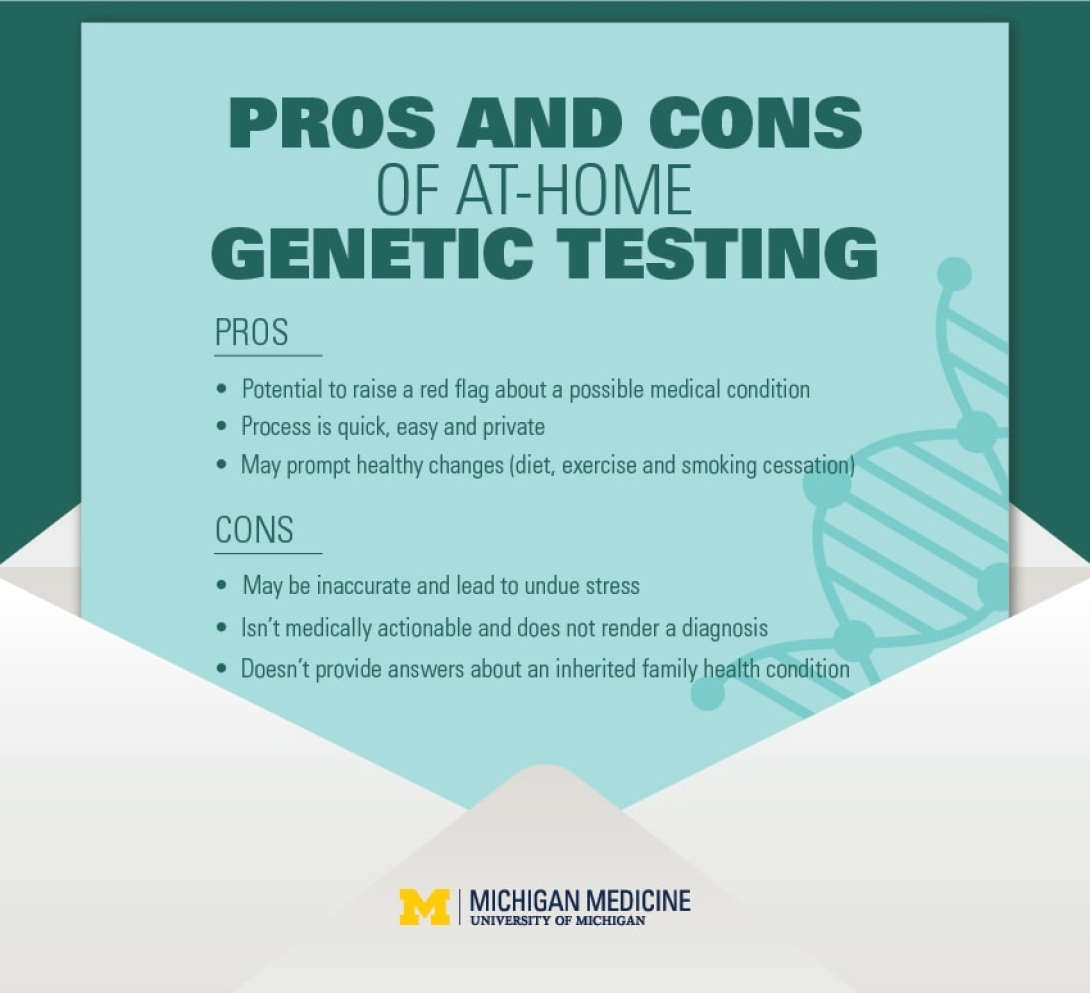Direct-to-consumer genetic testing isn’t harmful, but it has limitations. A Michigan Medicine genetic counselor explains both sides.
7:00 AM
Author |

Would you pay a few hundred dollars to learn more about your DNA and your potential for future health risks?
Direct-to-consumer (DTC) genetic testing, also known as at-home genetic testing, is nothing new, but its popularity continues to grow as more tests come on the market.
MORE FROM MICHIGAN: Sign up for our weekly newsletter
With a small sample of DNA (obtained from swabbing the inside of one's cheek), at-home genetic testing gives consumers access to information about ancestry, health risks, carrier status and familial traits. A health care professional isn't involved.
But how valuable is the information you'll get? Is it worth the money?
That depends, says Michigan Medicine genetic counselor Patty Arscott, M.S., M.Sc.
Whatever a person's reason for seeking at-home genetic testing, the most important thing, Arscott says, "is to understand its limitations and to use the results you receive wisely."

She spoke more about the tests:
Does an at-home test provide the same information as genetic testing ordered by a health care provider?
Arscott: At-home tests provide genetic information, but the results are not intended to be used to diagnose a health condition.
According to the Food and Drug Administration, results obtained from the tests should not be used for diagnosis or to inform treatment decisions. Users should consult a health care professional with questions or concerns about results.
DTC tests are looking at many genes versus a clinical genetic test that provides information about a specific gene directly linked to a stronger chance of developing a specific type of condition — a heart condition, for example.
How accurate is the information from these tests?
Arscott: The FDA, which regulates the manufacturers of genetic tests, says some of the tests lack scientific validity and others provide results that are meaningful only in the context of a full medical evaluation.
SEE ALSO: Collecting a Family's Cancer History: What You Should Ask
The tests may give you information about a slightly higher or slightly lower chance of developing a disease, but this isn't tied with a clinical picture. These are health conditions that are impacted by many factors, both genetic and non-genetic, such as lifestyle habits.
Someone may have a test that shows a lower chance of developing a specific disease, but the individual may still develop the disease. Or, someone may have an increased chance but not develop the disease.
Still, if an individual receives information about a possible health condition (such as heart disease or obesity) and uses that information to make lifestyle changes (pursuing a healthy diet or losing weight), this may have a beneficial impact.
What about sharing my results?
Arscott: DTC testing has somewhat of a social aspect, so people may tell others about their test results. It's up to you to decide if you want to share results with family, and up to them to opt out of hearing the results.
Learning details about your genetic makeup is a personal experience and may not be welcomed by everyone — and the results could yield more questions than answers.
For more information or to make an appointment for genetic counseling or testing at the Frankel Cardiovascular Center, call 888-287-1082.

Explore a variety of healthcare news & stories by visiting the Health Lab home page for more articles.

Department of Communication at Michigan Medicine
Want top health & research news weekly? Sign up for Health Lab’s newsletters today!





